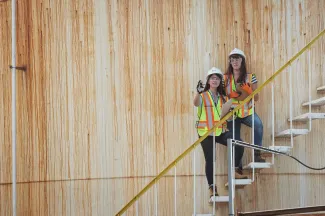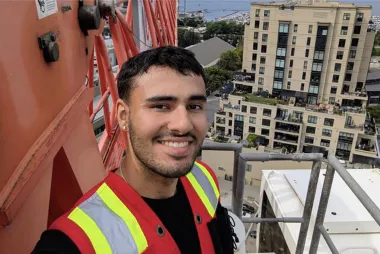
Ruddy Ndina
- Degree:
- Bachelor of Applied Science
- Grad year: 2018
- Program:
- Campus: Vancouver
What got you interested in engineering?
I was born in the Democratic Republic of Congo, a country that’s been embroiled in civil war for decades, and I grew up in a refugee camp in Swaziland. For some reason, even as a very small child, I was fascinated by bridges and loved spending hours drawing them. I received a scholarship to study at the United World College of Southern Africa, which eventually led to a full scholarship to study civil engineering at UBC.
How did you choose Civil Engineering?
Well, my interest in bridges definitely steered me towards Civil Engineering! But Civil Engineering as a discipline also appealed to me because it is so versatile – civil engineers work in many different areas of our built environment from public infrastructure like roads, railways and bridges to constructing mines and nuclear power plants.
Tell us about your career at Kiewit.
My fist job with Kiewit after graduating was in Calgary as a rebar field engineer on the $2-billion Southwest Calgary Ring Road Project. Appropriately, this project was all about bridges! Kiewit was building 47 bridges for the 101-kilometre road and as part of the structural team, I was in charge of managing the $50-million rebar contract. I then moved into a position as an earthworks field engineer, working on bridge backfills, embankments and tunnels.
In 2019 I moved to Ottawa to work as lead field engineer for stage 2 of the Ottawa LRT project and advanced into various roles over the next few years, including as project engineer of the civil and trucking group. This was one of my first significant management roles, which led me to pursue a certificate in project management through Sauder School of Business and then achieve the project management professional (PMP) certification.
In January 2024 I transferred to Kiewit’s Toronto office where I initially helped support change management and integration following the acquisition of a new company.
I’m now a senior project coordinator with the SMR-X team on the Darlington New Nuclear Project – the first of its kind in North America!
This groundbreaking clean energy project will be the blueprint for delivering sustainable, renewable energy to communities across Canada.
Any advice for engineering students?
It’s common for students to prioritize being the best in the technical aspects of engineering. While the technical elements are foundational, don’t overlook other skills, particularly communication. You could be very good at the technical aspects, but if you cannot communicate your ideas, you will have a harder time doing well in interviews, which may impact your ability to advance in your career. Engineers need to be able to have intelligent and meaningful conversations with all sorts of stakeholders, many of whom do not have a technical background.





